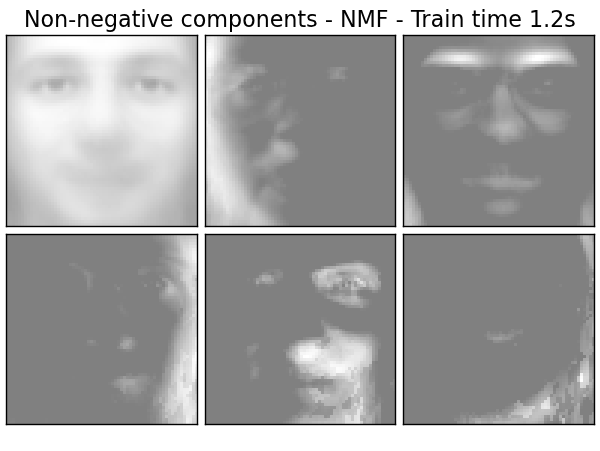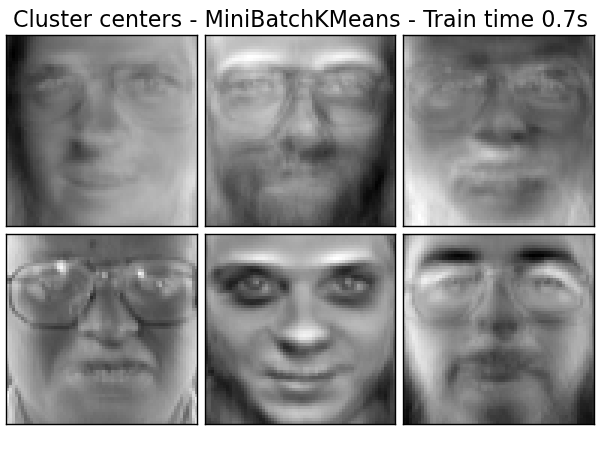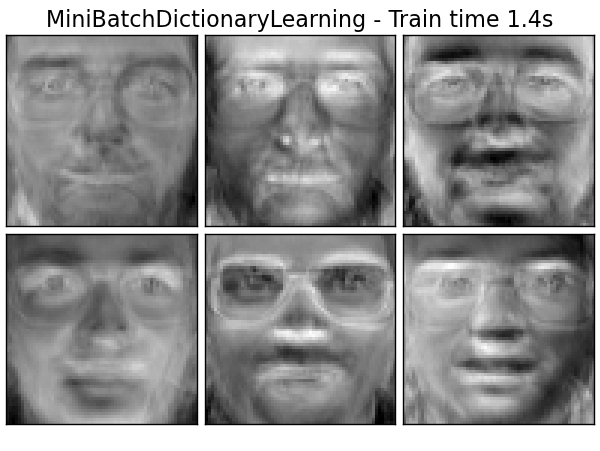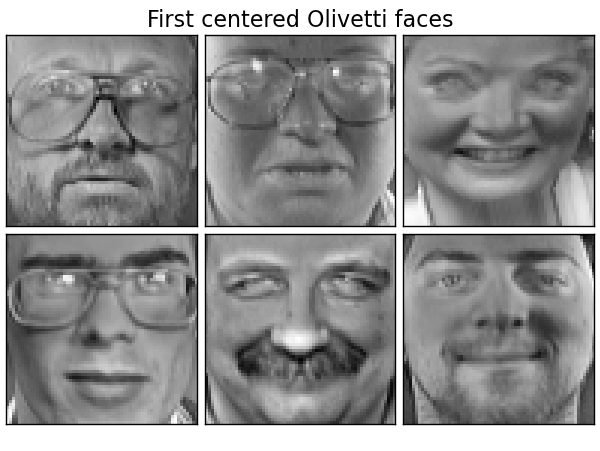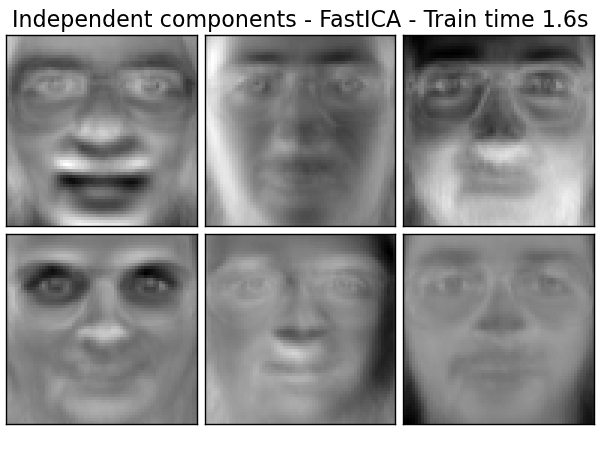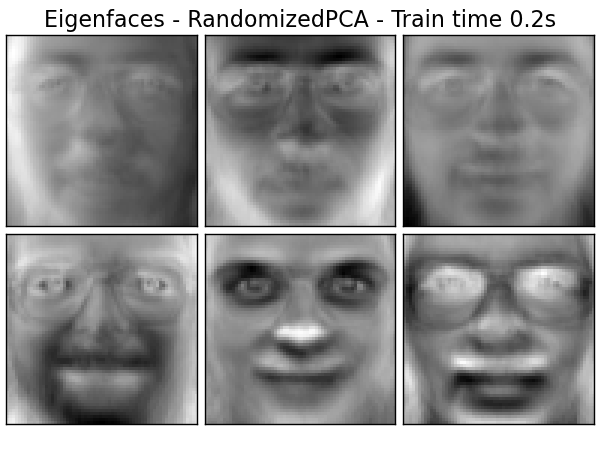Faces dataset decompositions¶
This example applies to The Olivetti faces dataset different unsupervised matrix decomposition (dimension reduction) methods from the module sklearn.decomposition (see the documentation chapter Decomposing signals in components (matrix factorization problems)) .
Script output:
Dataset consists of 400 faces
Extracting the top 6 Eigenfaces - RandomizedPCA...
done in 0.217s
Extracting the top 6 Non-negative components - NMF...
done in 1.240s
Extracting the top 6 Independent components - FastICA...
done in 1.573s
Extracting the top 6 Sparse comp. - MiniBatchSparsePCA...
done in 1.163s
Extracting the top 6 MiniBatchDictionaryLearning...
done in 1.409s
Extracting the top 6 Cluster centers - MiniBatchKMeans...
done in 0.657s
Python source code: plot_faces_decomposition.py
print __doc__
# Authors: Vlad Niculae, Alexandre Gramfort
# License: BSD
import logging
from time import time
from numpy.random import RandomState
import pylab as pl
from sklearn.datasets import fetch_olivetti_faces
from sklearn.cluster import MiniBatchKMeans
from sklearn import decomposition
# Display progress logs on stdout
logging.basicConfig(level=logging.INFO,
format='%(asctime)s %(levelname)s %(message)s')
n_row, n_col = 2, 3
n_components = n_row * n_col
image_shape = (64, 64)
rng = RandomState(0)
###############################################################################
# Load faces data
dataset = fetch_olivetti_faces(shuffle=True, random_state=rng)
faces = dataset.data
n_samples, n_features = faces.shape
# global centering
faces_centered = faces - faces.mean(axis=0)
# local centering
faces_centered -= faces_centered.mean(axis=1).reshape(n_samples, -1)
print "Dataset consists of %d faces" % n_samples
###############################################################################
def plot_gallery(title, images):
pl.figure(figsize=(2. * n_col, 2.26 * n_row))
pl.suptitle(title, size=16)
for i, comp in enumerate(images):
pl.subplot(n_row, n_col, i + 1)
vmax = max(comp.max(), -comp.min())
pl.imshow(comp.reshape(image_shape), cmap=pl.cm.gray,
interpolation='nearest',
vmin=-vmax, vmax=vmax)
pl.xticks(())
pl.yticks(())
pl.subplots_adjust(0.01, 0.05, 0.99, 0.93, 0.04, 0.)
###############################################################################
# List of the different estimators, whether to center and transpose the
# problem, and whether the transformer uses the clustering API.
estimators = [
('Eigenfaces - RandomizedPCA',
decomposition.RandomizedPCA(n_components=n_components, whiten=True),
True, False),
('Non-negative components - NMF',
decomposition.NMF(n_components=n_components, init='nndsvda', beta=5.0,
tol=5e-3, sparseness='components'),
False, False),
('Independent components - FastICA',
decomposition.FastICA(n_components=n_components, whiten=True,
max_iter=10),
True, True),
('Sparse comp. - MiniBatchSparsePCA',
decomposition.MiniBatchSparsePCA(n_components=n_components, alpha=0.8,
n_iter=100, chunk_size=3,
random_state=rng),
True, False),
('MiniBatchDictionaryLearning',
decomposition.MiniBatchDictionaryLearning(n_atoms=15, alpha=0.1,
n_iter=50, chunk_size=3,
random_state=rng),
True, False),
('Cluster centers - MiniBatchKMeans',
MiniBatchKMeans(k=n_components, tol=1e-3, chunk_size=20, max_iter=50,
random_state=rng),
True, False)
]
###############################################################################
# Plot a sample of the input data
plot_gallery("First centered Olivetti faces", faces_centered[:n_components])
###############################################################################
# Do the estimation and plot it
for name, estimator, center, transpose in estimators:
print "Extracting the top %d %s..." % (n_components, name)
t0 = time()
data = faces
if center:
data = faces_centered
if transpose:
data = data.T
estimator.fit(data)
train_time = (time() - t0)
print "done in %0.3fs" % train_time
if hasattr(estimator, 'cluster_centers_'):
components_ = estimator.cluster_centers_
else:
components_ = estimator.components_
if transpose:
components_ = components_.T
plot_gallery('%s - Train time %.1fs' % (name, train_time),
components_[:n_components])
pl.show()


